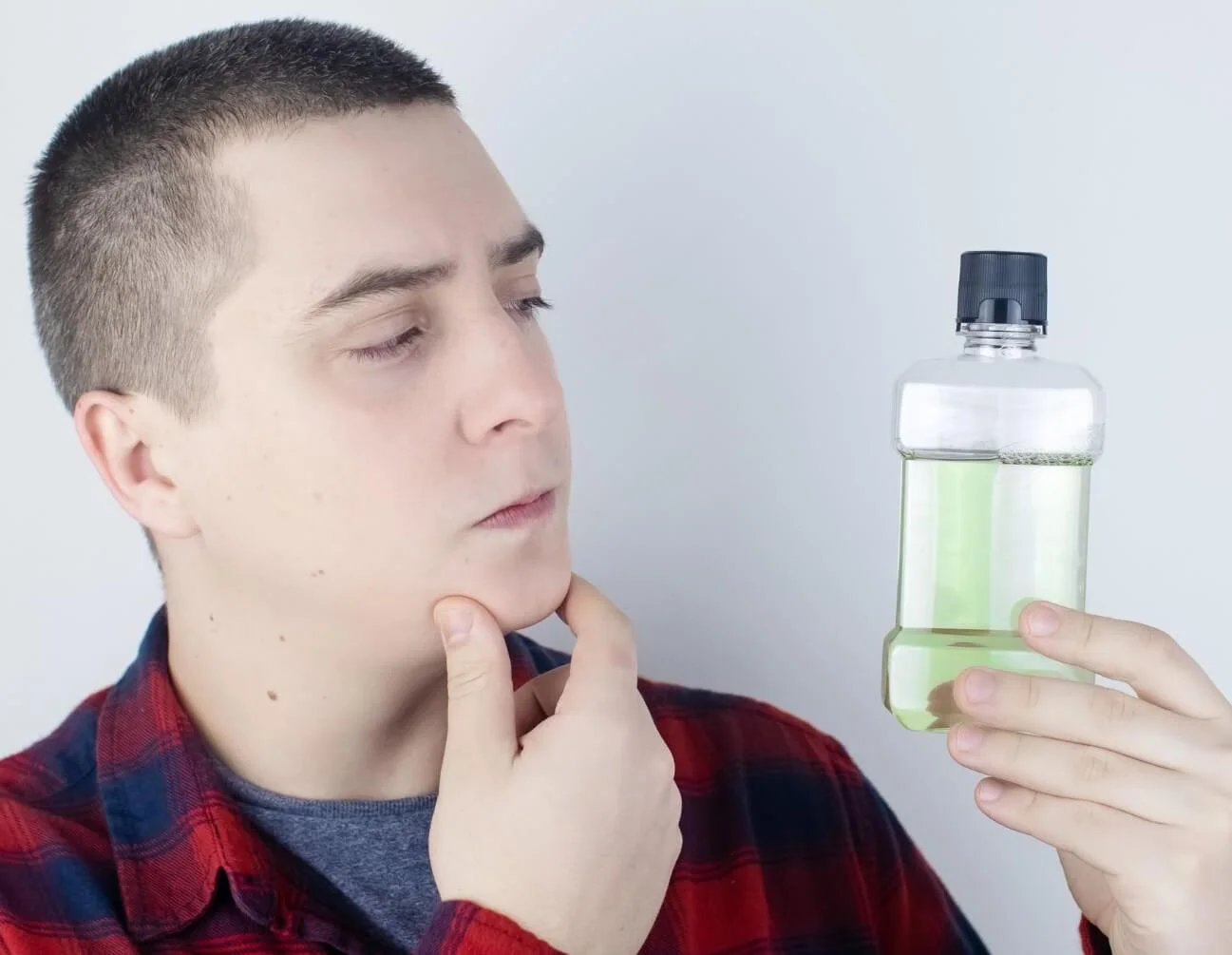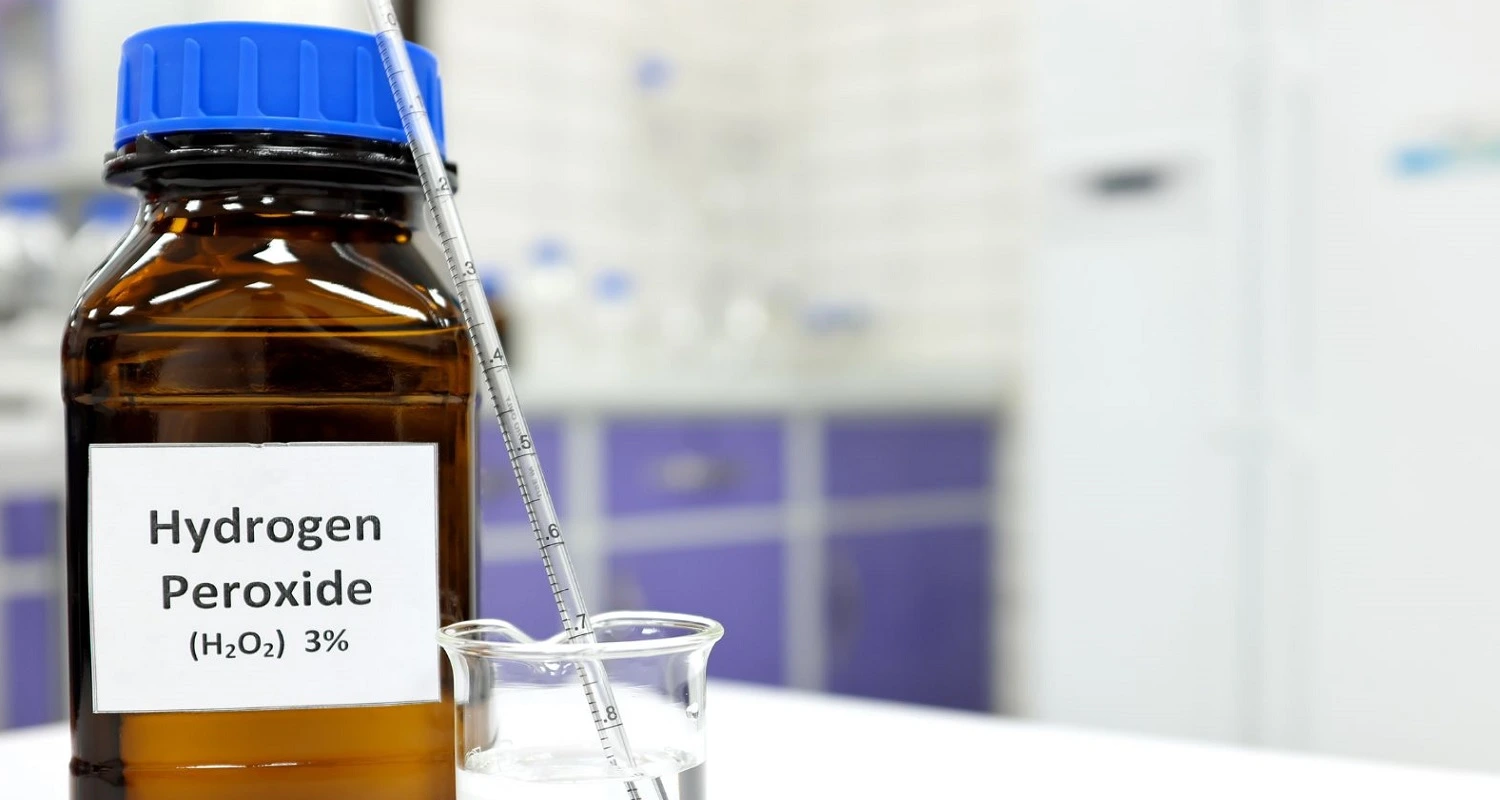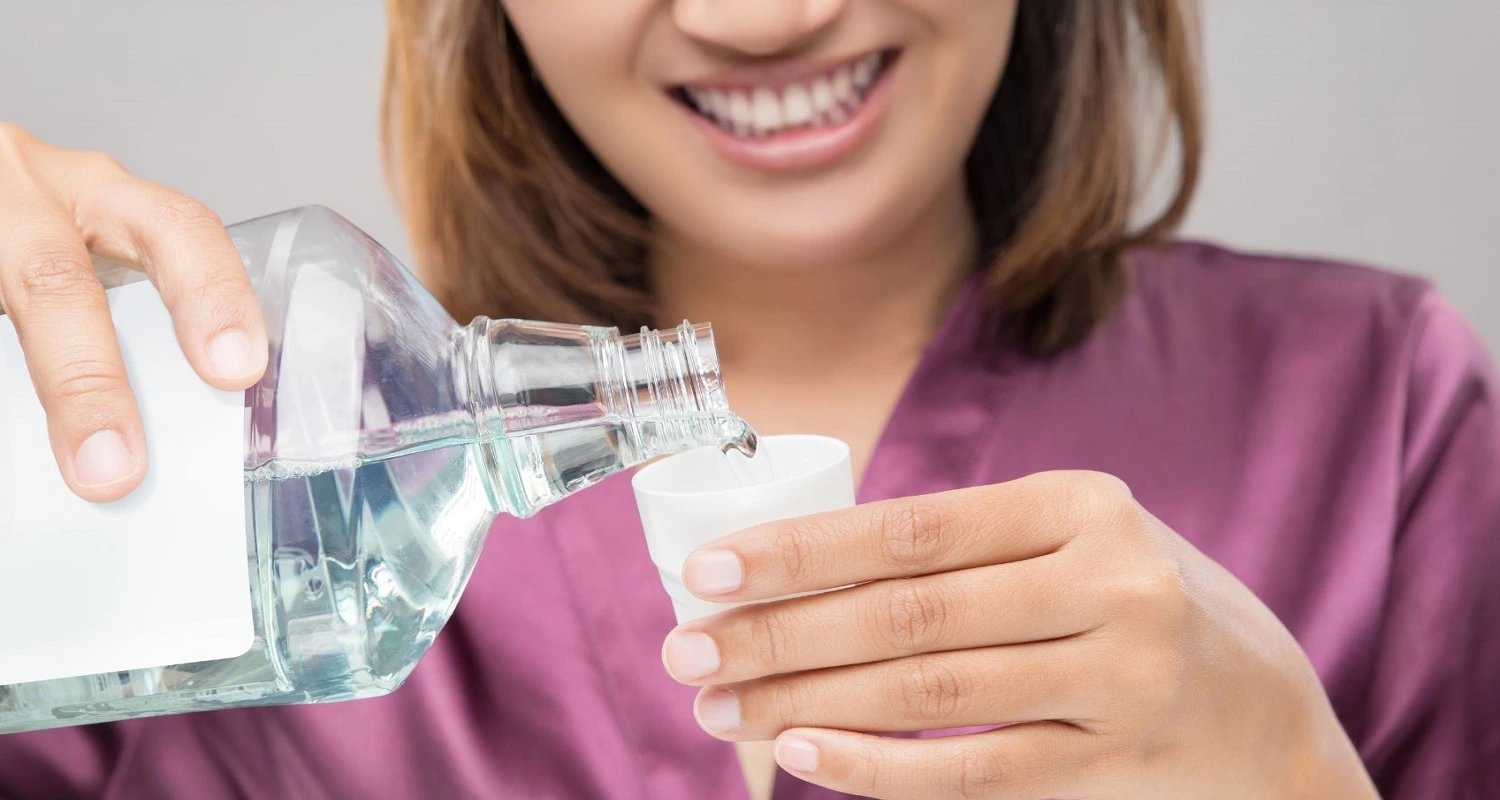Last Updated on: 12th December 2025, 05:24 am
Hydrogen Peroxide for Whitening Teeth: Everything You Need to Know
Teeth whitening is one of the most frequently performed procedures in the field of cosmetic dentistry. With so many people looking to have a brighter smile, it’s no surprise that oral hygiene practices are increasingly focusing on whitening methods.
Hydrogen peroxide has long been an important component of some professional and at-home teeth whitening techniques, so many patients might consider using over-the-counter hydrogen peroxide as an alternative to whitening teeth at home. However, before using this whitening agent, it is crucial to understand its mechanism of action, and the benefits and risks. Join us to learn more about the role of hydrogen peroxide in teeth whitening.
Also, we have a comprehensive guide about hydrogen peroxide for toothache. You can learn in this article the benefits and how to prepare the solution to relieve the pain in your tooth.
How does Hydrogen Peroxide Whiten Teeth?
It works as a whitening agent because, through an oxidation process, it is capable of breaking down dental stains. Its effectiveness has made it a common ingredient in various teeth whitening products. The chemical reaction generated by this substance disintegrates pigments and dark spots, resulting in whiter and brighter teeth.
Many investigations and tests have demonstrated the effectiveness of hydrogen peroxide for whitening teeth in eliminating or reducing tooth discoloration. This agent can be found in different concentrations, with 3% and 10% formulas being common for dental applications. For whitening in the dental office, there are products with hydrogen peroxide concentrations of up to 40%, but these should be used exclusively by oral health professionals as they can cause damage and burns to other tissues.
Homemade Teeth Whitening with Hydrogen Peroxide
Preparing and applying a natural teeth whitening solution with hydrogen peroxide is quite simple. However, it is advisable to consult a dentist before opting for at-home teeth whitening options. Remember that before thinking about changing the color of your teeth, it is essential that they are clean, without dental plaque or food remaining.
It can be used as a mouthwash or in the form of toothpaste.
1. Hydrogen peroxide mouthwash for teeth whitening:
● Typically, equal parts water and hydrogen peroxide are mixed to create a safe teeth whitening solution.
● Mix 2 Oz of 3% hydrogen peroxide + 2 Oz of water, and rinse for 2 minutes. Repeat this once a day every day.
2. Hydrogen peroxide and baking soda toothpaste to whiten teeth:
● Clean your teeth as you normally would before application to ensure the peroxide solution has the best possible access to the discolored areas.
● Mix baking soda with hydrogen peroxide until you obtain a smooth, consistent paste. Then, apply it to your teeth and brush them as you normally would.
● While this method can be effective in whitening teeth, this practice could wear down tooth enamel due to its abrasive nature.
Safety Considerations and Potential Risks
The use of this solution is not without concerns. One of the most common risks associated with its use is tooth sensitivity. The safety of tooth enamel is also a concern when using hydrogen peroxide for whitening teeth .
The use of products with high concentrations of hydrogen peroxide can also cause burns to the skin and mucous membranes. Thus, it is recommended that these be used only by an experienced dentist.
Although there are multiple over-the-counter products for at-home teeth whitening, only those products with the American Dental Association (ADA) Seal of Acceptance are considered safe and effective. If you are going to opt for any of these products, make sure they have earned this approval.
People will need to follow the instructions for using these products carefully for best results. Likewise, in the event of any unfavorable reaction, such as dental sensitivity, it is recommended to discontinue its use.
Why Should I Consult a Dentist Before Using Hydrogen Peroxide for Whitening Teeth?
The best way to reduce the risks of using the solution or any teeth whitening product is to consider a prior consultation with a dentist. Here are 4 reasons why it is recommended to visit a dentist before using hydrogen peroxide-based products to whiten your teeth:
1. Be careful with cracks: In some cases, teeth may have small cracks, which if exposed to the use of home treatments with hydrogen peroxide, can irritate the dental nerve or pulp, producing dental hypersensitivity. When the dentist detects these defects in the teeth, he can cover them before whitening them to avoid unwanted effects.
2. Choosing the correct treatment: Not all dental stains need to be treated with whitening. Depending on the type of discoloration, other procedures may be required for removal.
3. Personalized treatment: Depending upon the condition of each patient, the frequency of treatments is indicated. If the concentration or number of applications is exceeded in a given time, adverse effects may occur.
4. Need for adhesive restorations: Tooth whitening procedures can affect the bonding of resin restorations to the teeth, so if you require this type of treatment (such as reconstruction of tooth edges), it is preferred to perform them before undergoing teeth whitening.
Alternatives and Professional Teeth Whitening
In the field of professional cosmetic dentistry, there are teeth whitening treatments that offer fast and long-lasting results. These methods, supervised by a dentist, are usually safer and more effective than home treatments, although they are also more expensive.
In professional teeth whitening, other products can be used that can be effective and less aggressive with tooth enamel, such as microabrasion or whitening with carbamide peroxide. Also remember that if your teeth have any previous conditions, such as defects in the formation of the tooth structure, cavities or cracks, special precautions or additional procedures may be required to apply the whitening agent.
You can check this article, the best teeth whitening method, for more effective and detailed options.
Conclusion
Hydrogen peroxide has been shown to be an effective teeth whitening agent, but it is vital to use it with caution and knowledge. Whether you opt for professional treatment or a DIY approach, it is always advisable to consult a cosmetic dentistry specialist to ensure you are making the safest and most effective choices for your smile.
Frequently Asked Questions
What are the disadvantages of using hydrogen peroxide to lighten teeth?
It is advisable not to use it if you are currently experiencing any dental pain. This is because peroxide has the potential to seriously damage the enamel that protects your teeth if applied in excess or in high concentrations. Additionally, some of the more severe side effects of hydrogen peroxide whitening include inflammation of the tooth roots in the gum area.
How long does it take to use hydrogen peroxide to lighten teeth?
Typically, at a 3% concentration, you would need to keep your teeth in contact with hydrogen peroxide for approximately 5 hours daily for a period of 2 to 3 weeks to achieve noticeable teeth whitening. This can be difficult to achieve when dealing with a water-soluble liquid.
What are the reasons to avoid using hydrogen peroxide on teeth?
While it is true that hydrogen peroxide has the potential to lighten teeth in certain cases, safety considerations should not be ignored. Improper use of the solution could damage tooth enamel.
Is it safe to use hydrogen peroxide daily to lighten teeth?
“Continued use of hydrogen peroxide in high concentrations, especially if applied daily, can result in swollen gums and increased tooth sensitivity,” says Chris Strandburg, DDS, a California dentist, in an interview with Health.
What adverse effects can hydrogen peroxide have on dental health?
If used in high concentrations over a long period of time, hydrogen peroxide has the potential to damage tooth enamel and cause complications such as increased tooth sensitivity, development of cavities and eventual tooth loss, as well as irritation and inflammation. on the gums and teeth.
Is it safe to use toothpaste with 4% hydrogen peroxide?
Oral hygiene products such as toothpastes, rinses, and whiteners that contain up to 0.1% hydrogen peroxide are generally considered safe for the consumer. Therefore, toothpastes and mouthwashes should not have a concentration higher than 0.1% hydrogen peroxide to be considered safe.
Share:
References
1. Cirino, E. (Feb 3, 2023).Does hydrogen peroxide whiten teeth? Healthline.https://www.healthline.com/health/hydrogen-peroxide-teeth-whitening#:~:text=Using%20hydrogen%20peroxide%20in%20a,effects%2C%20including%20damaging%20your%20teeth.&text=Teeth%20whitening%20has%20become%20more,products%20come%20onto%20the%20market
2. Gillespie, C. (Oct 17, 2023). Does hydrogen peroxide whiten teeth—and is it safe? Health. https://www.health.com/condition/oral-health/is-it-safe-to-use-hydrogen-peroxide-to-whiten-teeth
3. Johnson, J. (Mar 20, 2023). Hydrogen peroxide for teeth whitening: What to know. https://www.medicalnewstoday.com/articles/326148
4. Martín, J., Vildósola, P., Bersezio, C., Herrera, A. C., Bortolatto, J. F., Saad, J. R. C., De Oliveira, O. B., & Fernández, E. (2015). Effectiveness of 6% hydrogen peroxide concentration for tooth bleaching—A double-blind, randomized clinical trial. Journal of Dentistry, 43(8), 965-972. https://doi.org/10.1016/j.jdent.2015.05.011
5. Benahmed , A. G. , Gasmi , A. , Menzel , A. , Hrynovets , I. , Chirumbolo , S. , Shanaida , M. , Lysiuk , R. , Shanaida , Y. , Dadar , M. , & Bjørklund , G. ( 2010 ). 2022). A review of natural teeth whitening.Journal of Oral Biosciences, 64(1), 49-58. https://doi.org/10.1016/j.job.2021.12.002
6. Greenwall-Cohen, J., Francois, P., Silikas, N., Greenwall, L., Goff, S., & Attal, J. (2019). The safety and efficacy of «over the counter» bleaching products in the UK. British Dental Journal, 226(4), 271-276. https://doi.org/10.1038/s41415-019-0011-6
-
Nayibe Cubillos M. [Author]
Pharmaceutical Chemestry |Pharmaceutical Process Management | Pharmaceutical Care | Pharmaceutical Services Audit | Pharmaceutical Services Process Consulting | Content Project Manager | SEO Knowledge | Content Writer | Leadership | Scrum Master
View all posts
A healthcare writer with a solid background in pharmaceutical chemistry and a thorough understanding of Colombian regulatory processes and comprehensive sector management, she has significant experience coordinating and leading multidisciplina...


















